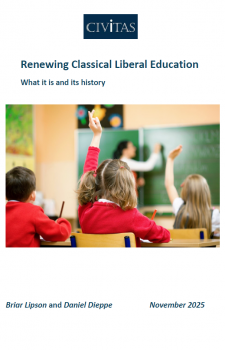Renewing Classical Liberal Education: What it is and its history
Briar Lipson and Daniel Dieppe, November 2025
Classical liberal education is the grounding of a child into a lifelong adventure through ideas and ideals, that they might enter, through the gradual cultivation of wisdom, style and virtue, into the fullness of humanity, ‘the good life’ as we might call it.
The tradition through which Western civilisation preserved and enriched its inheritance for 2,500 years, this education for freedom develops a person’s conscience, so that she might judge beauty and truthfulness, discern what is right and just, make the wise choice when it is not obvious.
However, three developments in culture have eroded the kind of schooling designed for personal freedom and conscience. These are:
- The advance of scientific materialism which, while necessary to science’s empirical and measurable definition of truth, now increasingly displaces humane study (the original purpose of the humanities).
- The rejection of past authorities.
- The provision of mass education by the state with implications for, amongst other things, teacher-student relationships, accountability, and the purpose ascribed to schooling.
Today, the consequences of these developments are so expansive that it is widely assumed by educators, policymakers and parents, and even more widely communicated to children, that the purpose of schooling is preparation for work; schools exist now to boost incomes and gross domestic product (GDP).
Since 2010, approaches to schooling that de-emphasised past authorities have been directly challenged and undermined in England by an evidence and knowledge-rich revolution. Relatedly, in reading, science and maths, England’s 15-year-olds now outperform their peers in almost all other Western countries. This is a meaningful achievement. It could herald the renewal of classical liberal education. Yet so far, unmoored from their rich tradition and rowing in siloed isolation against the tide of scientific materialist, statist and utilitarian ideas, the ability of even the most forthright liberal educators to re-orient schooling has been limited. It is still perfectly possible to pass through school, including with flying colours, having never picked up a work of classical literature, having never considered the nature of truth, without the basics of Western chronology, with not one line of poetry committed to memory. Modern schooling has become a gateway to riches but not our full humanity.
This report charts the history of classical liberal education, of its rise and fall, and what has now replaced it. Next will come a collection of case studies about bastions and green shoots of liberal learning, as well as recommendations for parents, educators and policymakers, for the renewal of classical liberal education in the UK, for the humane benefit of all.
About the authors
Briar Lipson trained through Teach First and has taught and led in state schools both before and since the ‘evidence and knowledge revolutions’. Having published influential reports on teacher recruitment in the UK, and the state of schooling in New Zealand, she now lives in England and home educates her children.
Daniel Dieppe is a researcher for Civitas. He has previously worked in Parliament for an MP and Peer and has also conducted research for the Family Hubs Network and the policy unit Tax and the Family.
Media Coverage
The Times: ‘A Christmas Carol ‘too easy for GCSE’‘
Charles Moore in The Telegraph: ‘We have forgotten what a classical liberal education is – and it may be almost too late to revive‘
Bijan Omrani in The Spectator: ‘Make education classical again‘
Briar Lipson and Daniel Dieppe in ConHome: ‘Why the ‘liberal’ vision for education is the right one‘
Jaspreet Singh Boparai in The American Mind: ‘Real Classical Education‘
Daniel Dieppe in The Critic: ‘The Case Against An Inspector Calls‘
Katie Lam MP in ConHome: ‘Why every child should have a ‘classical liberal education’ – and a Mr Bathurst‘
Lola Salem in CapX: ‘A classical education would civilise Britain’s children‘
Daniel Dieppe is The Critic: ‘What left and right get wrong about grammar schools‘
Times Radio: ‘Catch Up with Rod Liddle‘ (from 2:38:14)
Peter Berkowitz in RealClearPolitics: ‘Classical Liberal Education: Scarce, Embattled, Essential‘
Christian Today: ‘Report calls for return of classical liberal education‘
The Conservative Reader: ‘Wonky Thinking‘
Civitas: 3-minute video on X (Twitter)
The Educated Podcast (with David Cotter): ‘Renewing Classical Liberal Education | Daniel Dieppe‘
Download PDF
